On a hot summer day, if your dog is enjoying family time near the pool, he may see that backyard pool as a huge water bowl and slurp some water.
You should worry about your fido as pool water is safe to swim in but not safe to drink. Even though chlorine is safe at normal levels, the pool should never be your pet’s source of water.
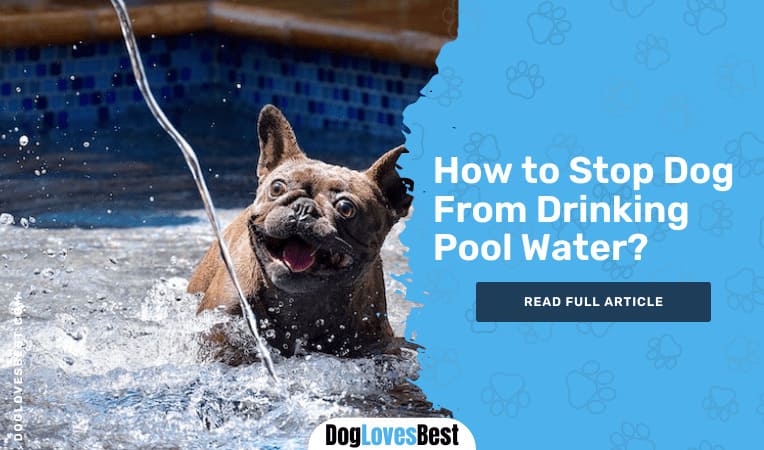
Pets should be prohibited from drinking in pools. Pool water contains chemicals other than chlorine, such as algaecide which may be harmful to the digestive system.
And if your pool isn’t well maintained, algae, excessive chemicals, and other things can also cause trouble.
What Happens When Dogs Drink Out of Too Much Pool Water?
In general, an occasional drink of pool water does not cause damage to a dog. Even humans inadvertently drink small amounts of pool water and rarely experience problems. However, your dog should not use the pool as a primary beverage bowl.
Too much water can be fatal as well. Water intoxication occurs when there is more water that can be processed in body fluids. This causes extreme depletion of sodium levels, resulting in a shift in the balance of electrolytes.
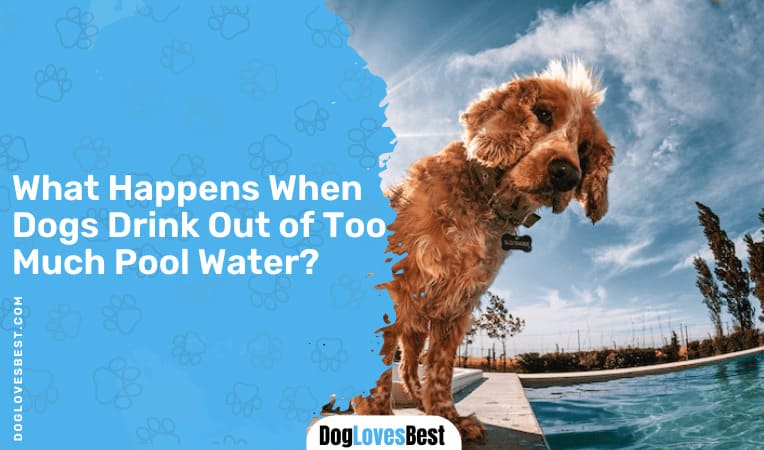
Drinking excess amounts from a pool of saltwater will lead to the same issues as commonly chlorinated pools. Furthermore, excessive salt intake can lead to diarrhea or electrolyte imbalances that can rapidly become life-threatening.[1]
Fortunately, pool water holds much less salt than the ocean. On the skin and mucous membranes of dogs, especially those with sensitive skin, saltwater pools may be more gentle than chlorinated pool water.
How Is Pool Water Harmful to Dogs?
An uncleaned swimming pool, or a pool that is not well maintained may have some harmful effects on your dog[2]. It will be even more harmful if your dog accidentally drinks the same water.
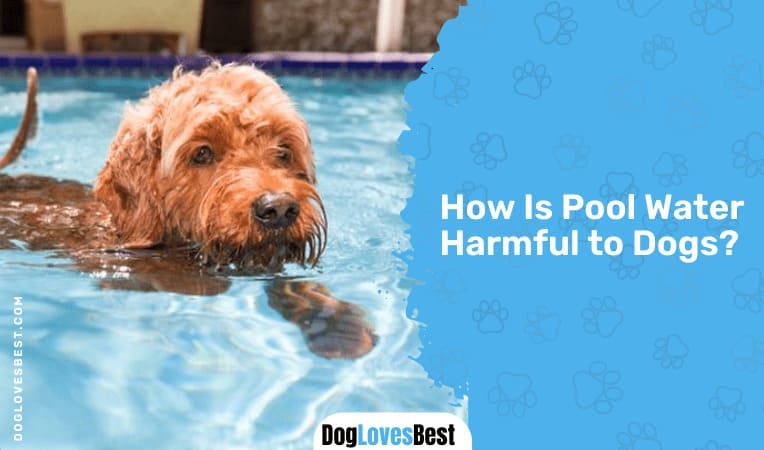
Toxins
Pool water contains pool chemicals, consisting mainly of chlorine and algaecides that keep the pool disinfected and free from plant life.
These chemicals may risk the dog’s health despite their beneficial purpose for pool maintenance. The levels of these toxins are deliberately low to prevent harm from occurring, as people ingest pool water by accident on a routine basis.
While most pets will not develop an issue from the occasional small pool of water drink, large amounts of pool water may cause problems, along with irritation or burning to the esophagus.
In addition, there may be a life-threatening reaction if the dog is allergic to the chemicals in the pool.
Microorganisms
Most of the chemical treatment is used to limit the growth of these microorganisms by bacteria and fungi who love pools, although trace amounts can remain even in the most well-maintained pool.
One such bacterium is found in pools. E is Escherichia coli (E. coli). Coli is absorbed via fecal ingestion. It will lead to many diseases.
Aspiration
When water or other foreign material enters the lungs, aspiration occurs. Because of inappropriate posture while drinking or the sheer amount of water available, pets drinking pool water can accidentally aspire to water.
Aspiration typically results in the swallowed liquid being coughed, gagged, and regurgitated.
Aspiration pneumonia is a serious medical problem, and animals showing signs, including breathing problems, loud breathing, anxiety, and dark lip and gum tinting, require immediate medical attention.
Stomach Upset
The most common problem with pets drinking pool water is stomach upset. Coldwater, like water heavily laden with chemicals, increases the chance of stomach upset.
Dogs that drink pool water to ward off dehydration are more prone to develop stomach upset.
Vomiting, regurgitation, and pain as a result of drinking pool water are common symptoms of stomach upset. While stomach upset is not a life-threatening problem, constant vomiting can lead to dehydration, which may be fatal.
What Are the Other Risks of Exposure to Pool Water?
Since most freshwater pools are treated with chemicals, particularly chlorine, it is a good idea to keep swimming sessions relatively short, as extended time in chlorinated water may cause eye and skin irritation in sensitive dogs.
And if the pool has a high chlorine level, it can also irritate the airways of your pet.
Dogs who swim frequently may have more frequent infections of the skin. Although owners may wonder whether this is correlated with exposure to chlorine, repeated infections are more likely to be associated with moist ears than the chlorine itself.[3]
If your pet is susceptible to chronic ear infections, then you should check to your veterinarian, in most cases, they prescribe a drying solution after swimming.
Are There Chlorine Alternatives For Pool?
If you think it’s a good solution to limit chemicals, think again! Improperly treated water in the pool can contain a variety of microorganisms including bacteria, algae, fungi, and parasites.
These can affect you and your dog via accidental ingestion, inhalation, or contact with skin and mucous membranes.
Bromine is the most popular alternative to chlorine for use in the pool and spa. Bromine, a close cousin to chlorine, has a less pungent smell and less common side effects of bleaching.
People who find chlorine irritating to their eyes or skin say such effects are less likely to be caused by bromine.
Because of these milder properties, people may prefer bromine, but it is more expensive than chlorine and less stable when exposed to sunlight, making it a poor choice for outdoor pools.
Do contact with a professional pool cares, they will direct you if bromine is a good choice for your situation.
Tricks to Stop Dog From Drinking Pool Water
Dog drinking pool water is a very common problem across the world. But there are very few remedies or tricks available on the internet. Here are some tested tricks by the team of DogLovesBest.
Provide fresh water
There are only two reasons why a dog drinks pool water. And one of those reasons is being thirsty. As a pet owner, we often forget to provide our pets with freshwater during excessive energy-consuming activities.
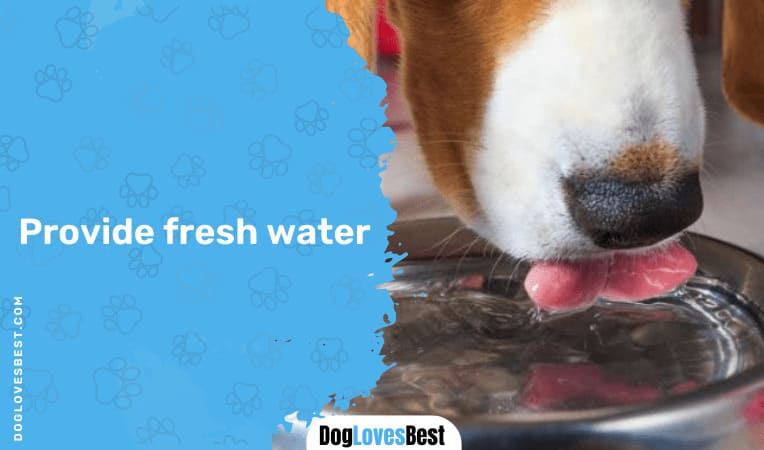
Which results in pool water drinking. This can be avoided by providing a freshwater bowl right near to the pool. So your dog can reach to the water easily.
Discourage drinking pool water
Every pet owner is always there with a pet while swimming. That means we will keep an eye on them and deter them if they drink water. Same as we do with a small child.
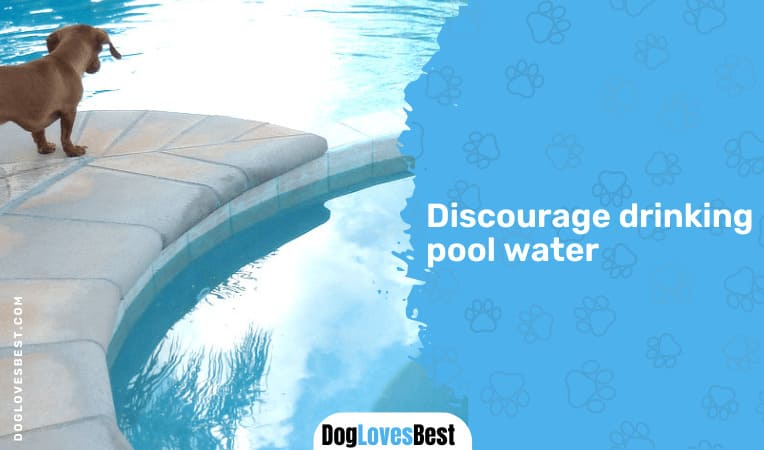
After a few gentle scolding, the dog will realize that drinking from the big bowl in the backyard is prohibited, and will search for his own water bowl.
Take short water intervals
If all tricks fall apart start pool training your dog, take a short water break where you take your pet to the source of freshwater to drink water. So he will drink water, soon after rehydration, the dog won’t drink water from the pool.
Swimming equipment
The second reason dog drink pool water is when the action is involuntary. In a simple word same as we human feel while drowning we often drink some water.
Buying proper swimming equipment for a dog to help them swim is the best way to avoid this. Not only will it eliminate drinking water in the pool it will also help your dog swim. You can get the best life vest for dogs which will certainly help.
Treat
Always treat your dog when they’re doing something good or something like directed. Just to make them realize they’re doing the right thing. Treat your dog if he goes to the freshwater bowl and drinks rather than a pool. But don’t give too much treat.
Conclusion
It is risky to drink pool water but do not worry if your dog drinks a little water. As some amount of water will not cause any serious problem. Pool water can cause minor GI discomfort, but you should discourage a dog from gulping of pool water.
References:
- Cyanobacteria Poisoning – VCA Hospitals
- PetMD Editorial. (2022a, August 12). Why is My Dog Drinking So Much Water? PetMD. https://www.petmd.com/dog/conditions/why-my-dog-drinking-so-much-waterDog Water Safety: Tips to Keep Your Pet Healthy. (2015, February 12). WebMD. https://pets.webmd.com/dogs/pets-water-safety
- Puschner, B. (2017). Debromoaplysiatoxin as the Causative Agent of Dermatitis in a Dog after Exposure to Freshwater in California. Frontiers. https://www.frontiersin.org/articles/10.3389/fvets.2017.00050/full
- Cyanobacteria Poisoning | VCA Animal Hospital. (n.d.-b). Vca. Retrieved November 24, 2022, from https://vcahospitals.com/know-your-pet/algae-poisoning

Karen Valenzuela is a dog behaviorist & trainer from Brooklyn, New York, and a freelancer for DogLovesBest. Karen is so much into dogs that she decided to become a dog behaviorist since she was in Middle School, and she did it too! She pursued her career as a dog behaviorist and now she’s certified through ACAAB. She has trained more than 10,000 dogs to correct their behavior and helped them develop a strong bond with their owners. In her free time, she loves to explore new ways of making the pet canine’s life more interesting and also has the ability to give those ideas the form of insightful posts.
